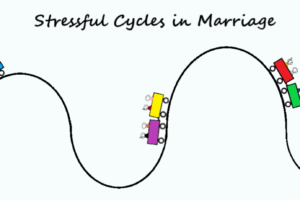
Domestic abuse is not about losing control, but a systematic method of asserting and maintaining power and control over a current or former intimate partner or a situation involving a current or former intimate partner.
Batterers Excuses
There are many excuses men use for being abusive to a current or former intimate partner. While some of the excuses batterers use may be factual, none are excuses for his abuse.
This is probably a good time to say that for 23 years I was the director and a co-facilitator of a batterers’ intervention program for men who were abusive to their female intimate partners. While I clearly understand women can be physical and emotionally violent, the scope of my practice and knowledge is working with men who are abusive to their female intimate partners.
When talking about male to female domestic abuse, it is important to understand that when men are abusive, it is because they can – physically and emotionally – and because their behavior gets them what they want. There are no legitimate excuses for this behavior.
Another important point in discussing male to female abuse is that there are certainly many men who have been physically, emotionally and sexually abused themselves. However, they rarely become abusive to anyone else. Of the men who choose to be abusive to their current or former intimate partner, it is their choice. These are the most common excuses they use to rationalize their behavior:
- Blame
“She started it.” “She hit me first.” “She wouldn’t let me leave.”
While a victim’s behavior may be disruptive or inappropriate, his abusive response is never exclusively BECAUSE of her behavior. He uses her behavior as an excuse for his abuse. It is unlikely he would make the same behavioral choice if his boss or his parent did the same thing to him.
- Lack of Anger Management
“I just lost it.” “She made me angry.” “I was ‘out of control’.”
Domestic abuse is NOT, nor has it EVER been, an anger management problem. People with anger management problems are not selective in who is on the receiving end of their abuse. Abusers are selective of who, when and where they are abusive.
- Alcohol or Drug Abuse
“I was under the influence.” “I don’t remember what I did.” “I blacked out.”
While there are many men who use and abuse drugs and alcohol, most are not abusive to their intimate partners. Being under the influence may alter a person’s behavior and decrease their inhibitions, but it is not the cause of selective abuse to a current or former partner.
- Psychiatric Diagnosis
“I am bipolar.” “I have anxiety!” “I have ADHD.” “I was off my meds.”
While there are many people who have been diagnosed with a psychiatric disorder, most are not abusive to their intimate partners. If someone has a psychiatric disorder and choses not to seek and actively participate in treatment or take their prescribed medication, it is not an excuse for being abusive.
- Abused as a Child
“I was abused as a child.” “I saw my dad beat the crap out of my mother.”
While there are many people who were abused as children, or witnessed abuse in their home, most do not go on to be abusive to their intimate partners. As a matter of fact, many men who were abused as children vow to never be abusive to their family of creation.
- Economy / Life Stressors
“Her family won’t stay out of our business.” “I lost my job.” “Inflation!”
Many people have life stressors including relationship conflicts, parenting difficulties, job or housing loss, inflation and paying high heating oil or gas prices. Most do not turn that disappointment and frustration into abuse of their intimate partner.
- Poor Communication Skills
“I don’t know how to express myself.” “Nothing I say comes out right.”
Victims are acutely aware of those messages, because their life, emotional and/or physical safety might depend upon receiving his message properly. A batterer using poor communication skills as a reason for abuse circles back to his blaming the victim.
- Jealousy
“If I didn’t love you, I wouldn’t be so jealous!”
Jealousy is about the fear of loss: loss of a partner, loss of attention/affection from the partner, loss of a relationship. Jealousy becomes an abuser’s tactic for control when he limits his victim’s ability to see family and or friends or to talk with family or friends.
- His low self-esteem
“I am a bad person.” “No one loves me.” “What about me?”
Batterers can have low self-esteem and can feel shame for their behavior. However, many batterers will ritualistically work to make sure their partner does not feel better about herself than he feels about himself. He wants her self-esteem to be as low as his.
- Traumatic Brain Injury / Concussion / Brain Trauma or Injury
“I have a TBI, I can’t control myself.” “It isn’t my fault.”
This is a tricky one. Head trauma frequently affects the frontal lobe, the portion of the brain that controls your emotions and impulsivity. The key is identifying if a pattern of coercive and controlling behavior was present BEFORE the injury.
What is interesting (at least to me!) is the skill in which a batterer can deflect and rationalize. When I listen to batterers, they are masters at:
- Blame: he wants to talk about HER alcohol use, HER psychiatric issues, HER anger problems, HER behavior and
- Excuses: he witnessed abuse as a child, he has poor communication skills, he is stressed out, work is hard.
While all of the excuses listed may have a kernel of validity, none are justifications for being abusive to an intimate partner.
Take Away Point
A batterer wants his victim to believe there are “reasons” / excuses for his abuse. He wants his victim to believe his abusive behavior toward her is not his fault. It is a lie. A batterer is abusive because it is his choice to be abusive. He believes his abuse will get him what he wants in the shortest amount of time with the least amount of effort on his part. Don’t get sucked in.
You may also be interested in reading these related blog posts: How People Become a Frog in Water, Jealousy vs. Envy, How to Define Domestic Abuse, What Are The Differences Between Anger Management Treatment And a Batterers Intervention Program
With warmest regards,
Thank you so much for reading this blog. If you enjoyed the content, please check out other blogs at:
www.relationshipsrelearned.com
www.rvingnomads.com
To be notified of new posts, please enter your email address and click on the Subscribe button.







